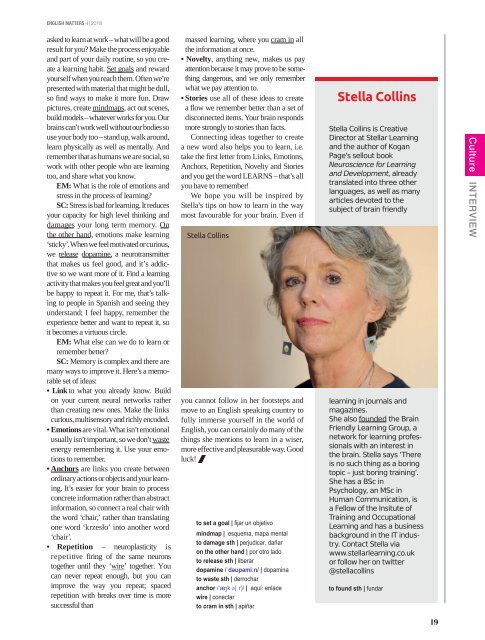EM 4 - 2018 (ESPAÑOL - digitalizado)
You also want an ePaper? Increase the reach of your titles
YUMPU automatically turns print PDFs into web optimized ePapers that Google loves.
ENGLISH MATTERS 4|<strong>2018</strong><br />
asked to learn at work – what will be a good<br />
result for you? Make the process enjoyable<br />
and part of your daily routine, so you create<br />
a learning habit. Set goals and reward<br />
yourself when you reach them. Often we’re<br />
presented with material that might be dull,<br />
so find ways to make it more fun. Draw<br />
pictures, create mindmaps, act out scenes,<br />
build models – whatever works for you. Our<br />
brains can’t work well without our bodies so<br />
use your body too – stand up, walk around,<br />
learn physically as well as mentally. And<br />
remember that as humans we are social, so<br />
work with other people who are learning<br />
too, and share what you know.<br />
<strong>EM</strong>: What is the role of emotions and<br />
stress in the process of learning?<br />
SC: Stress is bad for learning. It reduces<br />
your capacity for high level thinking and<br />
damages your long term memory. On<br />
the other hand, emotions make learning<br />
‘sticky’. When we feel motivated or curious,<br />
we release dopamine, a neurotransmitter<br />
that makes us feel good, and it’s addictive<br />
so we want more of it. Find a learning<br />
activity that makes you feel great and you’ll<br />
be happy to repeat it. For me, that’s talking<br />
to people in Spanish and seeing they<br />
understand; I feel happy, remember the<br />
experience better and want to repeat it, so<br />
it becomes a virtuous circle.<br />
<strong>EM</strong>: What else can we do to learn or<br />
remember better?<br />
SC: Memory is complex and there are<br />
many ways to improve it. Here’s a memorable<br />
set of ideas:<br />
• Link to what you already know. Build<br />
on your current neural networks rather<br />
than creating new ones. Make the links<br />
curious, multisensory and richly encoded.<br />
• Emotions are vital. What isn’t emotional<br />
usually isn’t important, so we don’t waste<br />
energy remembering it. Use your emotions<br />
to remember.<br />
• Anchors are links you create between<br />
ordinary actions or objects and your learning.<br />
It’s easier for your brain to process<br />
concrete information rather than abstract<br />
information, so connect a real chair with<br />
the word ‘chair,’ rather than translating<br />
one word ‘krzesło’ into another word<br />
‘chair’.<br />
• Repetition – neuroplasticity is<br />
repetitive firing of the same neurons<br />
together until they ‘wire’ together. You<br />
can never repeat enough, but you can<br />
improve the way you repeat; spaced<br />
repetition with breaks over time is more<br />
successful than<br />
massed learning, where you cram in all<br />
the information at once.<br />
• Novelty, anything new, makes us pay<br />
attention because it may prove to be something<br />
dangerous, and we only remember<br />
what we pay attention to.<br />
• Stories use all of these ideas to create<br />
a flow we remember better than a set of<br />
disconnected items. Your brain responds<br />
more strongly to stories than facts.<br />
Connecting ideas together to create<br />
a new word also helps you to learn, i.e.<br />
take the first letter from Links, Emotions,<br />
Anchors, Repetition, Novelty and Stories<br />
and you get the word LEARNS – that’s all<br />
you have to remember!<br />
We hope you will be inspired by<br />
Stella’s tips on how to learn in the way<br />
most favourable for your brain. Even if<br />
Stella Collins<br />
you cannot follow in her footsteps and<br />
move to an English speaking country to<br />
fully immerse yourself in the world of<br />
English, you can certainly do many of the<br />
things she mentions to learn in a wiser,<br />
more effective and pleasurable way. Good<br />
luck! <br />
to set a goal | fijar un objetivo<br />
mindmap | esquema, mapa mental<br />
to damage sth | perjudicar, dañar<br />
on the other hand | por otro lado<br />
to release sth | liberar<br />
dopamine /ˈdəʊpəmiːn/ | dopamina<br />
to waste sth | derrochar<br />
anchor /ˈæŋk ə( r)/ | aquí: enlace<br />
wire | conectar<br />
to cram in sth | apiñar<br />
Stella Collins<br />
Stella Collins is Creative<br />
Director at Stellar Learning<br />
and the author of Kogan<br />
Page’s sellout book<br />
Neuroscience for Learning<br />
and Development, already<br />
translated into three other<br />
languages, as well as many<br />
articles devoted to the<br />
subject of brain friendly<br />
learning in journals and<br />
magazines.<br />
She also founded the Brain<br />
Friendly Learning Group, a<br />
network for learning professionals<br />
with an interest in<br />
the brain. Stella says ‘There<br />
is no such thing as a boring<br />
topic – just boring training’.<br />
She has a BSc in<br />
Psychology, an MSc in<br />
Human Communication, is<br />
a Fellow of the Insitute of<br />
Training and Occupational<br />
Learning and has a business<br />
background in the IT industry.<br />
Contact Stella via<br />
www.stellarlearning.co.uk<br />
or follow her on twitter<br />
@stellacollins<br />
to found sth | fundar<br />
Culture INTERVIEW<br />
19


